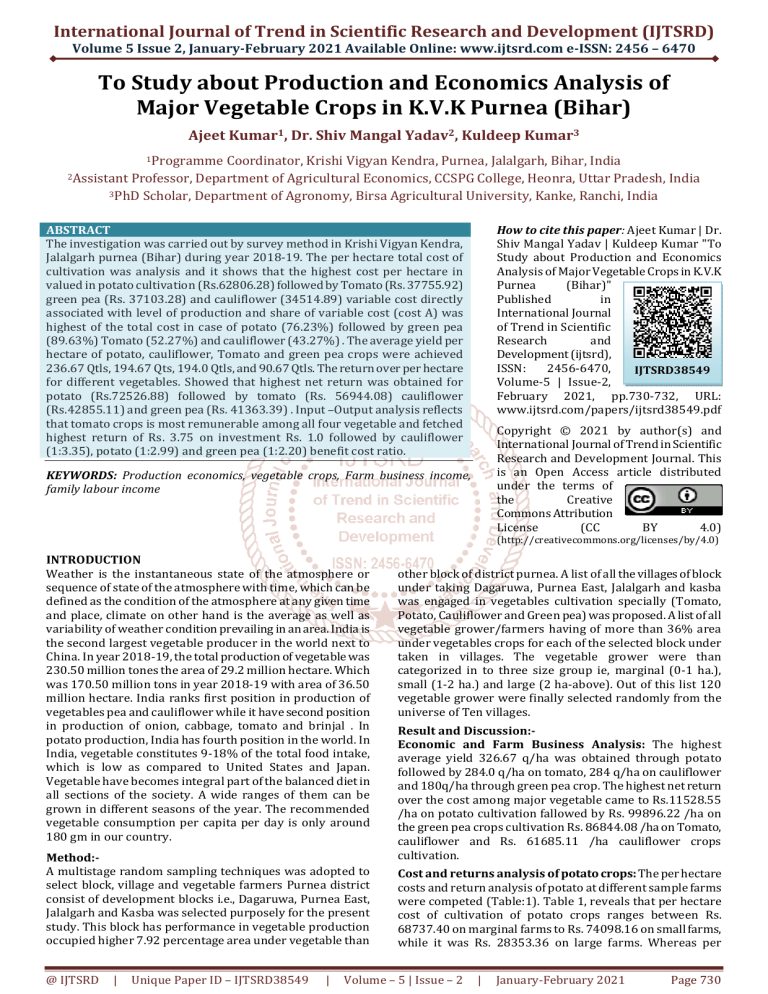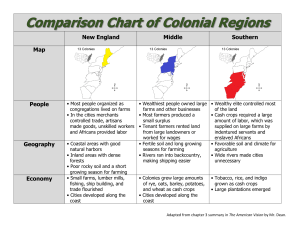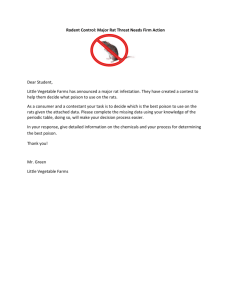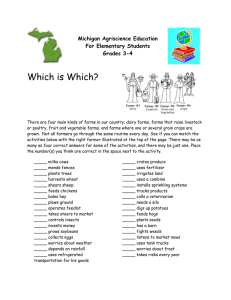
International Journal of Trend in Scientific Research and Development (IJTSRD)
Volume 5 Issue 2, January-February 2021 Available Online: www.ijtsrd.com e-ISSN: 2456 – 6470
To Study about Production and Economics Analysis of
Major Vegetable Crops in K.V.K Purnea (Bihar)
Ajeet Kumar1, Dr. Shiv Mangal Yadav2, Kuldeep Kumar3
1Programme
Coordinator, Krishi Vigyan Kendra, Purnea, Jalalgarh, Bihar, India
2Assistant Professor, Department of Agricultural Economics, CCSPG College, Heonra, Uttar Pradesh, India
3PhD Scholar, Department of Agronomy, Birsa Agricultural University, Kanke, Ranchi, India
ABSTRACT
The investigation was carried out by survey method in Krishi Vigyan Kendra,
Jalalgarh purnea (Bihar) during year 2018-19. The per hectare total cost of
cultivation was analysis and it shows that the highest cost per hectare in
valued in potato cultivation (Rs.62806.28) followed by Tomato (Rs. 37755.92)
green pea (Rs. 37103.28) and cauliflower (34514.89) variable cost directly
associated with level of production and share of variable cost (cost A) was
highest of the total cost in case of potato (76.23%) followed by green pea
(89.63%) Tomato (52.27%) and cauliflower (43.27%) . The average yield per
hectare of potato, cauliflower, Tomato and green pea crops were achieved
236.67 Qtls, 194.67 Qts, 194.0 Qtls, and 90.67 Qtls. The return over per hectare
for different vegetables. Showed that highest net return was obtained for
potato (Rs.72526.88) followed by tomato (Rs. 56944.08) cauliflower
(Rs.42855.11) and green pea (Rs. 41363.39) . Input –Output analysis reflects
that tomato crops is most remunerable among all four vegetable and fetched
highest return of Rs. 3.75 on investment Rs. 1.0 followed by cauliflower
(1:3.35), potato (1:2.99) and green pea (1:2.20) benefit cost ratio.
How to cite this paper: Ajeet Kumar | Dr.
Shiv Mangal Yadav | Kuldeep Kumar "To
Study about Production and Economics
Analysis of Major Vegetable Crops in K.V.K
Purnea
(Bihar)"
Published
in
International Journal
of Trend in Scientific
Research
and
Development (ijtsrd),
ISSN:
2456-6470,
IJTSRD38549
Volume-5 | Issue-2,
February 2021, pp.730-732, URL:
www.ijtsrd.com/papers/ijtsrd38549.pdf
Copyright © 2021 by author(s) and
International Journal of Trend in Scientific
Research and Development Journal. This
is an Open Access article distributed
under the terms of
the
Creative
Commons Attribution
License
(CC
BY
4.0)
KEYWORDS: Production economics, vegetable crops, Farm business income,
family labour income
(http://creativecommons.org/licenses/by/4.0)
INTRODUCTION
Weather is the instantaneous state of the atmosphere or
sequence of state of the atmosphere with time, which can be
defined as the condition of the atmosphere at any given time
and place, climate on other hand is the average as well as
variability of weather condition prevailing in an area. India is
the second largest vegetable producer in the world next to
China. In year 2018-19, the total production of vegetable was
230.50 million tones the area of 29.2 million hectare. Which
was 170.50 million tons in year 2018-19 with area of 36.50
million hectare. India ranks first position in production of
vegetables pea and cauliflower while it have second position
in production of onion, cabbage, tomato and brinjal . In
potato production, India has fourth position in the world. In
India, vegetable constitutes 9-18% of the total food intake,
which is low as compared to United States and Japan.
Vegetable have becomes integral part of the balanced diet in
all sections of the society. A wide ranges of them can be
grown in different seasons of the year. The recommended
vegetable consumption per capita per day is only around
180 gm in our country.
Method:A multistage random sampling techniques was adopted to
select block, village and vegetable farmers Purnea district
consist of development blocks i.e., Dagaruwa, Purnea East,
Jalalgarh and Kasba was selected purposely for the present
study. This block has performance in vegetable production
occupied higher 7.92 percentage area under vegetable than
@ IJTSRD
|
Unique Paper ID – IJTSRD38549
|
other block of district purnea. A list of all the villages of block
under taking Dagaruwa, Purnea East, Jalalgarh and kasba
was engaged in vegetables cultivation specially (Tomato,
Potato, Cauliflower and Green pea) was proposed. A list of all
vegetable grower/farmers having of more than 36% area
under vegetables crops for each of the selected block under
taken in villages. The vegetable grower were than
categorized in to three size group ie, marginal (0-1 ha.),
small (1-2 ha.) and large (2 ha-above). Out of this list 120
vegetable grower were finally selected randomly from the
universe of Ten villages.
Result and Discussion:Economic and Farm Business Analysis: The highest
average yield 326.67 q/ha was obtained through potato
followed by 284.0 q/ha on tomato, 284 q/ha on cauliflower
and 180q/ha through green pea crop. The highest net return
over the cost among major vegetable came to Rs.11528.55
/ha on potato cultivation fallowed by Rs. 99896.22 /ha on
the green pea crops cultivation Rs. 86844.08 /ha on Tomato,
cauliflower and Rs. 61685.11 /ha cauliflower crops
cultivation.
Cost and returns analysis of potato crops: The per hectare
costs and return analysis of potato at different sample farms
were competed (Table:1). Table 1, reveals that per hectare
cost of cultivation of potato crops ranges between Rs.
68737.40 on marginal farms to Rs. 74098.16 on small farms,
while it was Rs. 28353.36 on large farms. Whereas per
Volume – 5 | Issue – 2
|
January-February 2021
Page 730
International Journal of Trend in Scientific Research and Development (IJTSRD) @ www.ijtsrd.com eISSN: 2456-6470
hectare production varied between 310.0 qtls. on marginal
farms, 340.00 qtls on small farms and 360.0 qtls on large
farms. Average gross income, net income, family labour
income and farm business income were concluded as Rs.
336666.62, Rs. 262932.03, Rs. 265109.19 and Rs. 225037.56
. The input output ratio on sample farm was estimated 1:4.57
and it ranging from 1:4.5 ,on marginal farm 1:5.80 on small
farm and 1:4.59 large farms.
Cost and returns analysis of Tomato crops: Per hectare
costs and return analysis of tomato crops at different sample
farms were computed (Table-2). Table-2 reveals that per
hectare cost of cultivation of tomato crop ranges between Rs.
49073.11 large farm to Rs. 45739.09 marginal farms.
Whereas per hectare production varied between 305.0 qtls
on large farms, 290.0 qtls on small farms and 275.0 qtls on
marginal farms. Average gross income, net income, family
labour income and farm business income were concluded as
note Rs. 34800, Rs. 300579.96, Rs. 303250.52, Rs. 313098.31
respectively. The input-output analysis revealed that tomato
crops nearly three time benefit over cost which indicates
that tomato is a remunerative vegetable crops.
Cost and returns analysis of Green pea crops: The per
hectare costs and returns analysis of green pea crops at
different sample farms were computed (Table-3), Table-3
reveals that per hectare cost of cultivation for vegetable
green pea crop ranges between Rs. 42855.01 on marginal
farms to Rs. 51858.13 on large farms, whereas per hectare
production varied between 210.0 qtls on large farms, 195.0
qtls on small farms and 160.0 qtls on marginal farms.
Average gross income, net income, family labour income and
farm business income were conducted as Rs. 263200 Rs.
215296.10, Rs. 217568.94 and Rs. 225981.04 respectively.
Input-Output ratio on sample farm was estimated 1:1 and in
varied between 1:6.75 on large farm, 1:6.56 on small farms
and 1:6.47 on marginal farms.
Cost and returns analysis for cauliflower crops: The per
hectare costs and return analysis of cauliflower crops at
different sample farms were computed (Table-4). It is
obvious from the above table that per hectare cost of
cultivation of cauliflower ranges between Rs. 42503.81 on
marginal farms to Rs. 45939.07on large farms. Whereas per
hectare production varied between 310.0 qtls on large farms,
290.00 qtls exes on small farms and 275.0 qtls on marginal
farms . Average gross income, net income, family labour
income and farm business income were computed Rs.
291000.00, Rs. 246799.06, Rs. 249681.06 and Rs. 262463.69
respectively. Average input-output ratio on sample farm was
obtained 1:6.56 and varied between 1:2.59 on large farm,
1:6.47 on small farms to 1:6.75 marginal farms.
Table-1: Per hectare cost and profit for potato crop on sample farm (Rs./ha) rate Rs. 1000/quintals.
Size group of farms
Particulars
Overall average
Marginal(0-1ha) Small (1-2ha) Large (2 ha. above)
Cost A
56246.50
61705.54
66935.30
61629.11
Cost B
65623.43
71735.66
77313.36
71557.48
Cost C
68737.40
24098.16
78353.36
73729.64
Total yield
310.00
340
360.00
336.62
Gross Income
310000.00
340000.0
360000.00
336666.67
Net Income
241262.60
26597.84
281646.64
262937.03
Family Income
175639.17
268264.34
282686.64
265109.19
Family Business Income
185016.10
27705.54
293064.70
275037.56
Input-Output ratio
1:4.51
1:5.8
1:4.59
1:4.57
Table-2: Per hectare cost and profit for Totato crop on sample farm (Rs./ha) rate Rs. 1200/quintals.
Size group of farms
Particulars
Overall average
Marginal(0-1ha) Small (1-2ha) Large (2 ha.& above)
Cost A
32699.32
34860.82
37144.91
34901.68
Cost B
42009.22
44831.07
47408.14
44749.48
Cost C
45739.03
47450.07
49073.11
47420.74
Total yield
275.00
290.00
305.00
290.00
Gross Income
330000.00
348000.00
366000.00
348000.00
Net Income
284260.97
300549.93
316926.89
300579.26
Family labour
287990.78
303168.93
318591.86
303250.52
Income
Family Business Income
297300.68
313139.18
328855.09
313098.31
Input-Output ratio
1:7.21
1:7.34
1:7.46
1:7.34
Table-3: Per hectare cost and profit for green pea crop on sample farm (Rs./ha) rate Rs. 1400/quintals.
Size group of farms
Particulars
Marginal(0-1ha) Small (1-2ha) Large (2 ha. above) Overall average
Cost A
33377.35
37034.98
40644.55
37018.96
Cost B
39121.32
46244.98
50926.88
45431.06
Cost C
42855.01
48998.56
51858.13
47903.90
Total yield
160.00
195.00
210.00
188.00
Gross Income
224000.00
273000.00
294000.00
263200.00
Net Income
181144.99
224001.44
242141.87
215296.10
Family Income
184878.68
226755.02
243073.12
217568.94
Family Business Income
190622.65
235965.02
253355.45
225981.00
Input-Output ratio
1:5.23
1:5.57
1:5.67
1:5.49
@ IJTSRD
|
Unique Paper ID – IJTSRD38549
|
Volume – 5 | Issue – 2
|
January-February 2021
Page 731
International Journal of Trend in Scientific Research and Development (IJTSRD) @ www.ijtsrd.com eISSN: 2456-6470
Table-4: Per hectare cost and profit for cauliflower crop on sample farm (Rs./ha) rate Rs. 1000/quintals.
Size group of farms
Particulars
Overall average
Marginal(0-1ha) Small (1-2ha) Large (2 ha. above)
Cost A
19431.91
31762.95
34414.07
28536.31
Cost B
37549.81
41719.95
44687.07
41318.94
Cost C
42503.81
44164.95
45934.07
44200.94
Total yield
275.00
290.00
310.00
291.00
Gross Income
275000.00
290000.00
310000.00
291000.00
Net Income
232496.19
245835.05
264065.93
246799.06
Family Income
237450.19
248280.05
265312.93
249681.06
Family Business Income
255568.09
258237.05
275585.93
262463.69
Input-Output ratio
1:6.47
1:6.56
1:6.75
1:6.58
Conclusion:The economic analysis of the four major vegetable revealed
that potato crop is most productive and profitable vegetable
crop on the front of total yield (290.67 q/ha.) among all over
vegetable while tomato crop on per unit investment front by
fetching 3.09 times return over cost among all four vegetable
crops evaluated in the study area, so, it is suggested to the
farmer to allocate their input resources on tomato first then
potato to generate more economical and productive benefit
in the study area.
@ IJTSRD
|
Unique Paper ID – IJTSRD38549
|
References
[1] Radhay, Y and Y. Eswara Prasad (2017). Economics of
production and marketing of vegetables in Karim
Nagar district, A. P. India. J. Agric marketing, 15:55-61.
[2]
Dhinnon, K. (2018). Crop yield and economics of
potato based crop sequence at varying levels of
manorial treatment. Indian J. Agric.res, 30:91.
[3]
Pandit, A, N. K, Panday, Barsati Lal, K. P. chandram
and R. K, Rana (2018): Financing Agricultural: A study
of Bihar and East Bengal potato cultivar. India J. Agric.
Econ, 62:340-349.
Volume – 5 | Issue – 2
|
January-February 2021
Page 732





